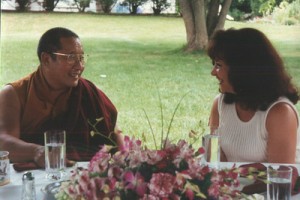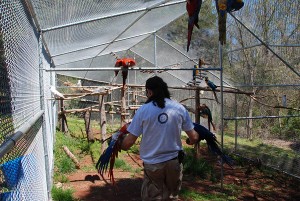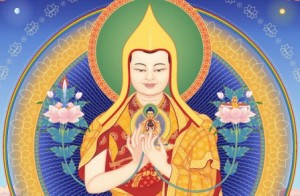
The following is an excerpt from a teaching by Jetsunma Ahkon Lhamo called “Nature of Mind” given in 1988, one month after her enthronement by His Holiness Penor Rinpoche:
Do you remember when you first started to seek the spiritual path? The innocent sense of longing that you felt. You must have felt in at one point of another, or you could not be here. You could not, you must have longed to purify suffering. You must have longed to be of benefit to someone, sometime. You must have longed to attain the end of suffering. And there must have been somewhere in there, the desire to do that in order to help others. There has to be. So that innocence, beautiful longing. Remember how happy you were at that time. There was a time when you were really happy, when you thought that. Now, of course we’re too sophisticated. We’re on the path and we’re already practitioners. So we tend not to continue that thought in our minds, but we should. We should constantly, with great longing. And we should make prayers in that direction. And that’s how you begin aspiration Bodhicitta. You begin to make prayers of longing. I long to benefit beings. I pray with all my heart than I can take whatever form necessary in order to bring peace to the world. In order to benefit beings. In order to end the suffering of beings. You should cultivate that, really and truly, you should do that until there are tears in your eyes. And you will find that when you begin to develop that ability, those tears are not sad tears. They are the happiest tears you’ll ever cry and they are heck of a lot more happy than going to the shopping mall and buying something new. I mean, really, that sounds like a superficial comparison, and it is. But, we spend much more time at the shopping mall than we do longing. And we should long constantly to end suffering.
So you begin in that way. And then you begin to think of the emptiness of self nature. Begin to, even if you don’t know how to meditate, if you haven’t the technique, then you might begin, or contemplate at least, think of the emptiness of self nature. And it goes hand in hand with that living the extraordinary life with that idea of compassion. They are inseparable. Because along with the emptiness of self nature, is the understanding that all suffering is born of delusion. And the antidote to that is the annihilation of that delusion. It’s the same as the meditation on emptiness. For instance, let’s see what do I need, we used to have a crystal ball up here, do we not have it anymore? How can I make a demonstration that I really want to. Well maybe I can come over here if my little wire goes far enough.
Look here, if you see this crystal, it looks really really clear and you may not, this may not be a good example. Oh here, can you see my hand coming through this crystal, can you see that? Okay, then can you see the blue. okay. Okay look at this crystal. This crystal is exactly like your mind. It is exactly like the nature of your own mind in this way. It is clear. It is in its natural state, it is free of any form. There is no form in there. It is said that the nature of mind is clear, self-luminous. That it exists in such a form that once any distinction is made, it is not understood. It is free of any contrivance. In the same way that this crystal is free. You look in there, and you see only clarity. A better example, of course is a crystal that is perfectly clear without any flaw. Because that is the crystal that is exactly like your mind. Perfectly clear, without any flaw. You in the natural state are that. You are pure suchness. And the moment you began to appear as you do now, was the moment you began to make distinction. But, in the natural state it is not so. The mind is clear, self-luminous, free of contrivance. Completely relaxed. It is not gathered around itself, because it has no conceptualization of self. It’s completely relaxed. It is suchness.
Now you look at the crystal and you think that the crystal is like that also, and that the crystal might be understood as a symbol of that suchness in this way. Now you put your hand behind it, and look, you see blue. Has the crystal become blue. Well, you have to look at it on two levels. Your looking right now, this crystal looks blue. So, in that sense, the crystal appears to have become blue. But, if I take it away, does the Crystal change? Is it blue now? So what is blue? Who perceives blue? Look at that, you can see this hand. See the flesh tone in there. It’s very, when you look at it, do you see flesh tone? Do you see it? So the crystal has become like that, hasn’t it. But, then you take it away, and the flesh tone is gone. The crystal is the same. It is the same, it is completely unaltered. Who perceives the flesh tone? What is the flesh tone? This appearance of blue. This appearance of this tone. This appearance of phenomena in general. This appearance of phenomena in general is merely conceptualization. Who is it perceived by? Think for instance about this.
Here is a very crude example, but then I told you I was born in Brooklyn, I’m not making any apologies, that’s it. Okay, let’s take two objects, we have two objects here, we have chocolate, and we have shit, yes shit, you heard it right. We have chocolate and we have shit, okay, there both brown, I mean, I’m sorry but we have to do this, there both brown right? They both have a creamy consistency. So sorry. They both have a strong aroma. What make one chocolate, and the other one shit? Who determines the difference. Who is the taster? Who sees this? Who sees that? What is happening here? All conceptualization, all phenomena arises from the belief in self nature and from the compulsion at that point to make self appear separate from other and to make a reactive relationship necessary. All of your mind consists of the phenomena of hope and fear. Of discrimination in a subtle and dense way. But, the nature of mind itself remains steadfast, clear, uncontrived and when there is no concept of self it is just like that, pure, perfect, it is only suchness. Only that. And it cannot be altered, it remains unchanged. And the weird thing about is the minute you that start talking about it, you’ve removed yourself from the potential to understand it.
How do you get free then of distinction between shit and chocolate. How do you stop seeing the hand? How do you stop seeing the blue? How do you perceive that true nature? Little by little you have to dis-engage the idea of self and you have to meditate on that. And you can begin in this way, and I recommend that you do this. Whether you are a dyed in the wool, or dyed in the cotton, I don’t know which fabric is, dyed in the cotton Buddhist, or whether you are person that has never even heard of any of this before. You can begin to do in this way. I don’t recommend that you taste both shit and chocolate, but you can try, let’s say, honey and lemon juice. And you can look for yourself, who is the taster? You say, I taste. Where am “I”? Well I’m right here. Okay, where here? Okay, let’s take you apart. Let’s take you apart. Let’s find out where “I” is. We’ll look first in the feet, we’ll start low and work high. Did you find “I” in there? Take it apart. Really, you have to make slides of everything. You have to buy yourself a microscope and make slides and see if you can find “I”, okay? Go all the way up, look everywhere that you can, examine every single molecule. Go all the way up to the heart. Everybody thinks hearts are big these days. Let’s look in the heart, see if we can find “I”. Then we’ll look in the throat. What part do you identify with the most. You have great legs? We’ll look at your legs. You have beautiful figure, we’ll look at every part of it. Look at everything. Let’s look in the brain. Everybody thinks they come from their head right? So we’ll look in the brain. Where is “I”? You can even look in your eye, eyeball. See if you can find “I” there. No matter how hard you look, if you make microscopic slides of every single part of it, you will not find “I” in this body. You will not find it. Well you say, there must exist an “I”, because how can I go from lifetime to lifetime? And, I’m telling you that the idea of “I” is only that. It is a conceptualization that has built around it so much karmic flagellants that the profundity of it has managed to exists for lo these many eons. And at that point you can begin to understand that essentially, nothing has happened. In truth, nothing has happened. You can begin to mediate on the emptiness of all phenomena.
You want to look at cup, look at cup. Find cup in there. Take it apart. Grind it up, find cup. Cup is the idea of cup. And you can continue with everything, your house, family. You can’t practice Dharma because you have a family. Ok, let’s take your house. We’re going to take your house. We’re going to examine your house. Let’s take it apart, we’ll put it all under the microscope. Find family. Then we’ll examine the people that you are calling family. Which one of them is family. We’re going take them all apart, just the way we took you apart. Where are we going to find family. Family is a concept. Who made it up? You did. Where are you? I haven’t found me yet.
It’s crazy, but it’s a good way to start practicing. It’s a good way to start practicing because your going to find that everything you live by, the things that make you suffer, the things that you bust your tail trying to do, everything that you do is based around an idea that you made up. You did, you made it up. And it has effected you for all this time. So you can begin there. It’s true that it would take sometime to achieve realization by meditating in that way. But, it’s a really good place to start. And meditating on the emptiness of self and on the emptiness of phenomena as well can give you the foundation and the strength to live the extraordinary life of compassion that I’m talking about. And it’s that kind of extraordinary life of compassion and with the profound prayers that you will return in whatever form necessary in order to benefit beings and that even now you will able to benefit beings if you consider that that is the utmost important thing in your entire life and you yearn for that.
You actually have a little side benefit there that I’d like to tell you about. And the side benefit is that you are purifying your mind of the garbage that we have gathered around it associated with self and desire in such a way that you will be able to actually move closer meditating on successfully and knowing that profound nature of mind. That uncontrived natural state. Just through the virtue of considering things in this way. Considering yourself to be only important in as much as you can benefit beings. And to begin to function in that way. But, I tell you, the more that you get on an ego trip about this, or anything else. I’ve done this, and I was ? in my last life, you know that kind of thing, the kind of thing. The kind of thing that we do, and your ? is doing it. The more that you do that kind of thing, the more you are creating the causes of suffering and the further and further away you get from perceiving the natural state. Because the natural state, is as it is. Remains unpolluted. Untarnished. Untainted. And the only thing that makes us perceive something else, is that we have stuck the blue in the back of the crystal basically and that blue symbolically is conceptualization. The way to liberate the mind from the belief in that phenomena of blueness as being inherently real is to meditate on the emptiness of phenomena. The emptiness of self nature and to live a life that causes the purification of the mind. And actually cleanses of discursive thought. That is the ticket. And no matter who your teacher is, if you really could talk heart to heart with any profound, profoundly realized teacher of any religion. I believe and I’m willing to say this publicly, any teacher, any time if they are profoundly realized, no matter what religion they started, if they are profoundly realized, will tell you that the answer is the end of ego and all of it’s desire. And the conceptual proliferation’s that come with it. That the realization of the natural state is the answer, and that that state is uncontrived, unchanging, unborn and infinite.
So, that’s your Kellogg’s cereal boxtop nature of mind teaching for today. Complete with Brooklynese language and I’m afraid that that happens to be on a regular basis. I sort of slip back into Brooklyn, Jewish, Italian mode. But, anyway, I hope that you enjoyed that.
Copyright © Jetsunma Ahkon Norbu Lhamo. All rights reserved








